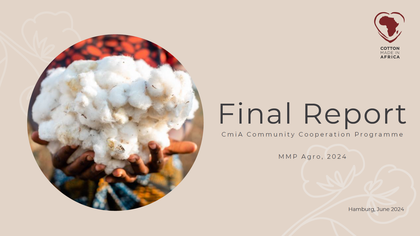

Filtering instead of boiling: The new way to clean drinking water in Uganda

Bio Sand Water Filters - UGANDA
Installation of bio-sand-waterfilters in order to gently purify the water from existing sources.

Addressed issue / objectives
- Installation of 1,000 bio-sand-waterfilters
- Training of the community's farmers and craftsmen in how to operate the waterfilters
- Training on how to build new waterfilters

Project budget
Total project costs: 22 229 €
Funding amount: 17 100 €
Cotton company contribution: 5 129 €

Project location
- Districts of Abim, Kaplebyong, Dokolo and Kaberamaido in north-east Uganda, Africa

Project benefits
Around 1,000 CmiA farmers, mainly women and the members of their households (an estimated 10,000 community members) benefit from the intervention.

Project status / duration
October 2023 - May 2024
Finished
The way of building bio-sand-waterfilters
Distribution of the finished filters

Project details
Drinking water was in short supply
During the needs analysis by MMP Agro, the communities emphasised the lack of clean drinking water as a major problem. The villagers obtained their water from nearby springs. However, this had to be boiled before it could be consumed, otherwise it could make people ill. But firewood and charcoal were not always available. Moreover, the demand for firewood was depleting the local forests.
Bio-sand-waterfilters can solve the problem
Bio-sand-waterfilters are very effective in purifying water and removing all bacteria and impurities, making the water drinkable without the need to boil it. Bio-sand-waterfilters can purify up to 20 litres of water per hour, providing safe, clean water for the entire household. The bio-sand-waterfilter is a constructed frame filled with layers of sand and gravel that slowly purifies the water. It is made from locally available materials that are not harmful to humans or the environment. Its use is free of any risks or hazards for the user or the environment.
As part of a joint project between the GoodTextiles Foundation, the Aid by Trade Foundation (AbTF) (owner of the CmiA standard) and MMP Agro, farmers who grow CmiA cotton in the districts of Abim, Kaplebyong, Dokolo and Kaberamaido in north-east Uganda have received a total of around 1,000 bio-sand-waterfilters. Around 1,000 CmiA farmers, mainly women and the members of their households (an estimated 10,000 community members) benefited from this. The funds - 17,100 euros were provided by the GoodTextiles Foundation and 5,129 euros were added by the cotton company - were used to build the bio-sand-waterfilters.
When the project was started, the plan was to build 150 bio-sand-waterfilters. During the time of the project, it had turned out that the donated money made 1,000 bio-sand-waterfilters possible.
Water quality testing
Comprehensive testing on various water samples before and after filtration with bio sand filters was conducted to
assess the effectiveness of the filters.
Pre-filtration water qulity: High levels of bacterial contamination, including E. coli and other pathogens, were found. Presence of turbidity and suspended particles, making the water unsafe for consumption.
Post-filtration Water Quality: Significant reduction in bacterial contamination. E. coli and other pathogens were reduced to safe levels. Improved turbidity levels, with water becoming clear and free of suspended particles. Overall, the filtered water met health and safety standards, making it safe for drinking and other household uses. These results underscore the Bio-sand filters’ effectiveness in transforming unsafe water into a safe, reliable source of drinking water.
Resumee
The project has significantly improved access to safe drinking water in the target communities. Initial feedback indicates a reduction in waterborne diseases and improved quality of life. Community members report increased agricultural productivity and better overall health, attributing these improvements to the availability of clean water.
Sustainability
Long-term, sustainable help beyond the duration of the project
The lifespan of the bio-sand-waterfilters is estimated to be at least 15 years, making them a long-term solution for households.
MMP AGRO also trained farmers and local craftsmen in the community in the construction of bio-sand-waterfilters in order to expand the project. This ensures that new filters can be built even after the 15-year lifespan of the filters and that additional filters can be built locally for other community members and beyond.

Mesurable results
Output - Availability of drinking water, knowledge about how to build bio sand filters and replicate them with local materials.
Outcome - Reduced rate of waterborne diseases, improved living conditions especially for women.

















